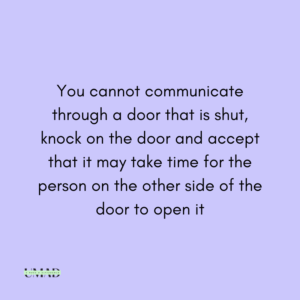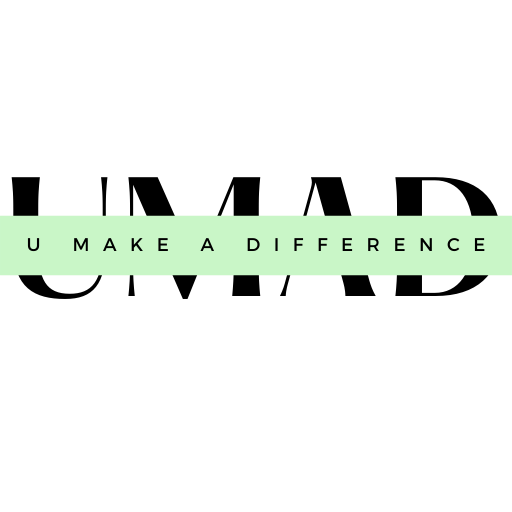DISCOVERING THE POWER OF FACILITATION
At the end of the third day of the I Make a Difference (IMAD) persoal development program, Mariaan was so excited to get home. She wanted to ‘tell’ her teenage children what they needed to do for their personal growth.
The morning of the fourth day of IMAD, she shared with me and the group how her enthusiasm to share her growth with her teenagers had resulted in them shutting down on her, judging and resisting her. She had imposed her process, her beliefs, her processing, and her discoveries on her children, and they did not want a bar of it.
We had some amazing conversations that morning and as a result of Mariaan’s previous night’s experiences, as a group we explored and talked through a facilitated approach to sharing with her family, what she had learned and how she had grown. These were some of the learnings…
SHARE YOUR EXPERIENCE RATHER THAN 'TELL'
Instead of telling her family, it was a matter of honoring that this was her process and not theirs. This was something she was going through and experiencing emotionally, mentally, energy-wise, and physically, and her purpose for taking this journey was for HER growth.
So the focus was to be on herself and her growth. Then as she expressed herself differently (because of her growth), her children and partner would potentially and naturally see her transformation.
This creates the space for them to ask questions or make comments about this. This was then Mariaan’s indicator that the door was open for her to explore more with them, as now they were interested in her process.

Then she could respond to their questions, being mindful not to tell them what to do. Unless they asked her for suggestions or her opinion. If they did, then this was the time to share her thoughts, but only her opinion or suggestions.
She would be sharing her process, rather than imposing it. Then she could ask questions so that they discovered the answers that she had discovered for herself. The power of this type of interaction – her teenagers discover what they know and take ownership of it, rather than them being told.
This is a facilitative approach.
WHAT IS FACILITATION?
- Covers All Interactions: Facilitation extends beyond business settings, reaching into parenting, relationships, coaching, mentoring, and self-improvement. It can be utilized in one-on-one conversations or group interactions.
- Understanding the Essence: At its core, facilitation revolves around the intricate dynamics of process and processing. It requires developing a profound awareness, insightful understanding, and practical know-how of human processes. Through this, we gain the ability to navigate and guide individuals or groups in their journey of processing and comprehending the challenges they encounter.
By recognizing its power and applying facilitation techniques, we can unleash our full potential in every aspect of life.
WHAT IS A PROCESS?
- INTERNAL PROCESSES: Humans have internal processes operating within them, such as emotional, mental, physiological, energy and physical processes. Resisting and suppressing these processes, like holding back tears, hinders and blocks the natural process. Movement forward and growth and transformation are hindered.
- EXTERNAL PROCESSES: Processes operate in our external interactions through group dynamics, conversations and relationships. Peoples issues with one another, resistance, lack of understanding and lack of awareness can block these processes, hindering communication and interactions.
- THE JOURNEY AND TRANSFORMATIONS: A process represents the path toward an outcome, conclusion, realization, or temporary pause. It entails the steps and flows leading to a desired destination or state. Processes are ever-evolving, continuously giving way to new transformations and different stages.
- INTERNAL PROCESSING: Processing refers to the internal experience of thoughts and emotions that arise in response to a process. It is the introspective aspect, providing insights and reflections as we navigate through the various stages of the journey.
WHAT IS A FACILITATOR?
A facilitator is a process expert who has a deep understanding and appreciation of processing in the process. To be a true facilitator understanding your own process emotionally, mentally, sensory, physiologically, physically, and energy wise, knowing what is happening for you, why, where it comes from, and trusting your process is imperative, for several reasons:
- To understand and facilitate other individuals’ or groups’ processes and processing, you need to understand your own and know how to self-facilitate, otherwise, you do not have a personal reference point for understanding what works and what does not.
- In understanding your process, you gain insight into how people process and operate, what processing they can experience, and why. This builds a foundation from which to develop your understanding of the approaches, styles, and processing that are different to and similar to you so that you understand people.
- In being able to self-facilitate and manage your process and processing you will know how to facilitate other people’s processes and processing. You will also come to understand that it is important you maintain neutrality so that you do not influence the individual or group process (as was evidenced in Mariaan’s initial approach with her teenagers) so that you can support and work with the other person’s process.
WHAT IS FACILITATION?
Facilitation, as defined by Webster’s Dictionary, is THE ACT OF MAKING SOMETHING EASIER OR LESS DIFFICULT. In the context of personal and group dynamics, facilitation encompasses the following:
- Guiding Exploration through Questioning: Facilitation involves skillful questioning to support individuals in exploring their own processes and processing. By asking thoughtful and incisive questions, facilitators help individuals delve deeper into their thoughts, feelings, and actions, leading to self-discovery and self-responsibility.
- Making Progress Easier: Facilitation aims to make progress smoother and more manageable for individuals. It offers support, guidance, and a conducive environment for individuals to navigate their journeys, providing the necessary assistance to overcome obstacles and achieve their goals.
- Co-journeying and Creating a Supportive Environment: Facilitation entails walking alongside individuals or groups, providing steadfast support as they uncover their own knowledge and determine the actions they wish to take. Facilitators create an environment conducive to growth and utilize appropriate approaches to cultivate self-discovery and personal transformation.
WHERE FACILITATION CAN BE APPLIED?
As the title of this blog says “Facilitation a Powerful Approach For Enhancing Human Interactions”. A facilitated approach can be taken in any human interaction you experience. It can be effectively applied in conversations, writing, parenting, leadership, friendships, and self-reflection.,
- In a CONVERSATION, in writing of A BOOK, in AN EMAIL, or in A TEXT.
- As a PARENT in ONE-ON-ONE conversations, family conversations, ISSUES BETWEEN FAMILY MEMBERS (both adult to child and child to child), EXPLORE EMOTIONS, explore situations and incidents, and exploring GREAT THINGS THAT HAPPENED.
- As a LEADER, TRAINER, MENTOR and or EMPLOYEE in one-on-one discussions, MEETINGS, general conversations, TRAINING, PERFORMANCE REVIEWS, and any other INTERACTION with employees or fellow leaders and managers.
- As a FRIEND, in EXPLORING EMOTIONS, situations, RELATIONSHIPS, CONFLICTS, and any other context.
- With YOURSELF, in exploring your emotional, mental, physical, sensing, physiological, and energy processing.
WHY USE A FACILITATION APPROACH?
AS A PARENT
For The Child
- Facilitation creates the space for children to freely explore their thoughts, emotions, sensations, and experiences without judgment or influence. It helps them gain clarity about their own truth by processing their feelings and thoughts. It encourages them to be responsible for themselves and accountable to themselves. Through this process, they discover the answers within themselves, develop self-awareness, and build confidence in knowing and trusting themselves.
 For The Parent
For The Parent
- A parent can set aside their thoughts and fully focus on understanding their children without judgment or expectations. The intention should be solely to ask questions and genuinely comprehend their child’s perspective, allowing them to process naturally and freely. Parents should let go of the pressure to have all the answers and instead empower their children to discover the answers within themselves.
For The Family
- To build transparency, support, and understanding. When you facilitate you understand, accept, and love a person.
AS A LEADER
For The Employee
- You create a supportive environment for employees to reflect, grow, and understand themselves. Encouraging employees to take ownership of their experiences without judgment or expectations and assume responsibility for their actions. This fosters confidence and accountability, empowering employees to make and stand by their decisions.
For The Leader
- You can listen attentively to the person’s thoughts and perspectives to gain insight and understanding. This helps support decision-making and interactions with the individual or group. Encouraging the continued exploration of ideas, situations, issues, areas for improvement, and successes. You support their personal growth.
For The Organization
- A culture of transparency is fostered, where individuals take responsibility, accountability, and ownership of their emotions, thoughts, and actions. This cultivates creativity, idea sharing, and innovation, and unleashes individual potential.
WITH YOURSELF – Self facilitation
- By self-facilitating your own processing, you are empowered to take greater responsibility for your thoughts, feelings, actions, and choices. This increases your awareness and empowers you to influence the outcomes in your life. You become less reliant on others for emotional well-being and require less reassurance. With confidence and understanding of your own process, you trust yourself and have the capability to navigate and manage life’s challenges.
Facilitation can be applied in various situations and interactions. It is a powerful and valuable approach to life that supports natural growth and unlocks greater benefits.
